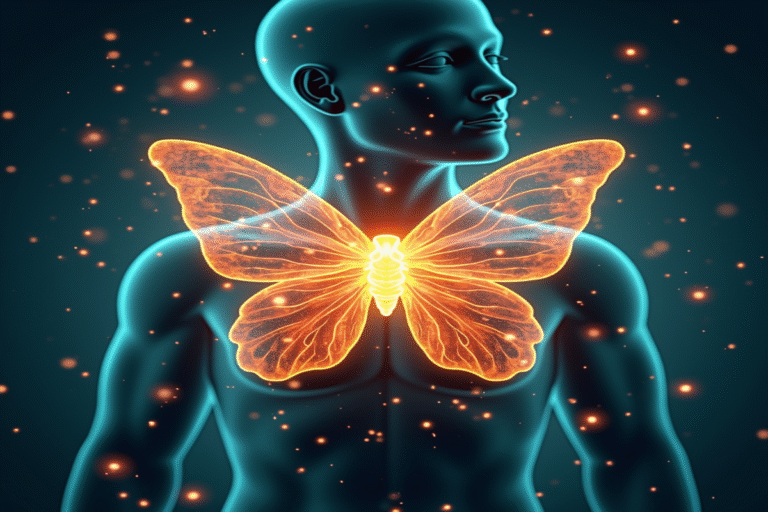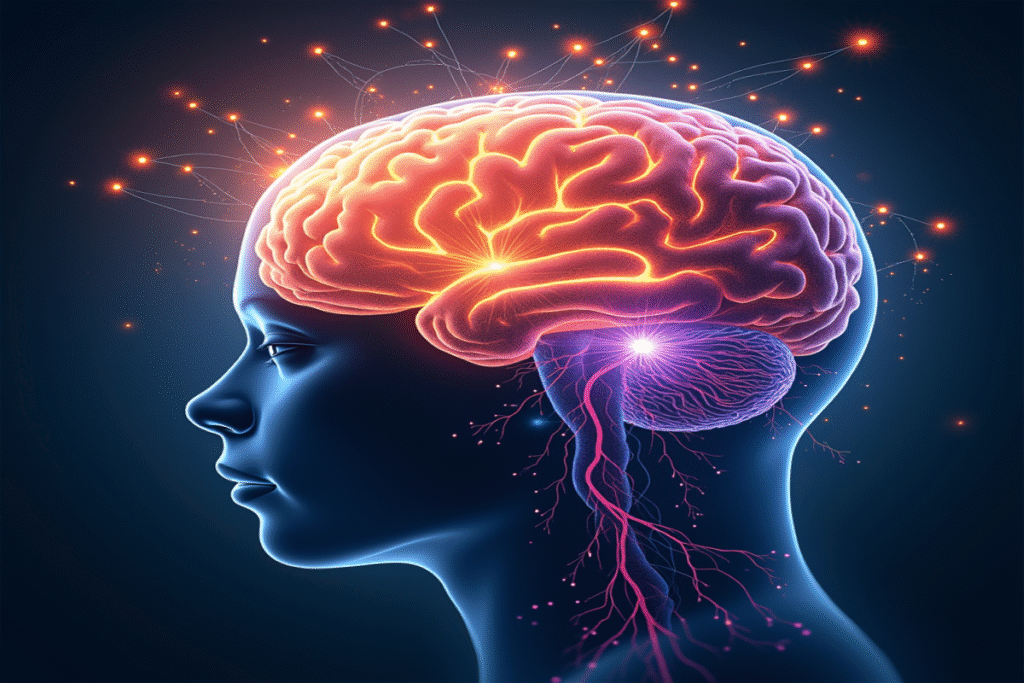Have you ever wondered how your body maintains its energy levels, regulates temperature, and keeps your brain functioning at its best? The answer might surprise you – it’s largely thanks to a trace mineral called iodine and its fascinating relationship with your thyroid gland. This remarkable partnership powers some of your body’s most essential functions in ways that seem almost magical.
The Thyroid: Your Body’s Hidden Command Center
Nestled in your neck, just below your Adam’s apple, sits a butterfly-shaped gland that weighs just 15-20 grams – yet its influence on your body is immense. Your thyroid acts as the thermostat and energy regulator for nearly every cell in your body. What’s its secret? Thyroid hormones – but these can’t be produced without iodine.
The thyroid is the only organ in your body that can absorb and use iodine effectively, making this relationship one of the most exclusive and specialized in human biology. Without this relationship, life as we know it would be impossible.
The Atomic Dance: How Iodine Becomes Thyroid Hormone
When you consume iodine (whether from seafood, dairy products, or iodized salt), your body embarks on an incredible journey:
- Your bloodstream carries iodine to your thyroid gland.
- Special cells called thyrocytes actively pump iodine inward against its concentration gradient – meaning your thyroid can concentrate iodine up to 40 times higher than blood levels.
- Inside the thyroid, iodine atoms attach to tyrosine (an amino acid) on a protein called thyroglobulin.
- Through a series of chemical reactions, the thyroid produces two critical hormones: T3 (containing 3 iodine atoms) and T4 (containing 4 iodine atoms).
This process is so precisely calibrated that it can detect and adjust to even tiny fluctuations in your body’s iodine levels. It’s one of nature’s most impressive biochemical feedback systems.
Surprising Metabolism Facts: The Thyroid-Iodine Connection
Did you know that thyroid hormones influence the metabolism of every single cell in your body? Here’s how this microscopic process affects your daily life:
- Thyroid hormones determine how quickly your cells convert food to energy.
- They regulate your heart rate, breathing, and body temperature.
- A healthy thyroid keeps your brain functioning optimally – affecting memory, concentration, and mood.
- These hormones influence how quickly food moves through your digestive tract.
- They even affect your skin, hair, and nail growth.
The iodine-thyroid relationship is so powerful that just a teaspoon of iodine is all you need throughout your entire lifetime – yet this tiny amount is absolutely essential for survival.
The Global Health Revolution Few People Know About
Before the 1920s, goiter (enlarged thyroid) and cretinism (severe developmental issues due to thyroid hormone deficiency) were common in certain regions of the US called the “goiter belt.” The simple addition of iodine to table salt became one of the most successful public health interventions in history, virtually eliminating these conditions in developed countries.
Today, iodine deficiency remains the leading preventable cause of intellectual and developmental disabilities worldwide. An adequate iodine supply during pregnancy can increase a child’s IQ by up to 13 points – a powerful testament to this mineral’s importance for brain development.
The Metabolic Maestro: How Thyroid Hormones Control Energy
At the cellular level, thyroid hormones work like a conductor leading an orchestra. They enter the nucleus of cells and regulate which genes get turned on or off, controlling:
- Mitochondrial activity (your cells’ power plants)
- Basal metabolic rate (how much energy you burn at rest)
- Heat production (why you feel cold when your thyroid is underactive)
- Oxygen consumption at the tissue level
This is why thyroid disorders so profoundly affect energy levels. Too much thyroid hormone (hyperthyroidism) can make you feel anxious, cause weight loss despite increased appetite, and create heat intolerance. Too little (hypothyroidism) leads to fatigue, weight gain, cold sensitivity, and slowed thinking.
Your Body’s Remarkable Iodine Conservation System
Your body has evolved an ingenious system for recycling iodine. When thyroid hormones complete their work and break down, your body recaptures up to 80% of the iodine for reuse. This remarkable conservation mechanism evolved because iodine has historically been scarce in many environments – particularly inland areas away from the iodine-rich oceans.
Your thyroid also adapts during pregnancy. A pregnant woman’s iodine requirements increase by nearly 50% to support both her needs and her developing baby’s brain and nervous system – one of many ways the human body prioritizes reproduction and child health.
Feeding Your Thyroid: Sources of Iodine
Curious about how to ensure your thyroid gets what it needs? The best natural sources of iodine include:
- Seafood: especially seaweed (like kelp), cod, and shrimp
- Dairy products: milk, yogurt, and cheese (due to iodine in cattle feed and sanitizing solutions)
- Eggs: particularly the yolks
- Iodized salt: the most common source worldwide
- Fruits and vegetables: though content varies based on soil conditions
Your body absorbs nearly 100% of the iodine you consume – another indicator of how precious this resource is to your physiology.
The Delicate Balance: Too Little or Too Much?
While iodine deficiency gets more attention, excess iodine can also disrupt thyroid function through a mechanism called the Wolff-Chaikoff effect – where the thyroid temporarily reduces hormone production when exposed to large amounts of iodine. This protective mechanism prevents dangerous surges in metabolic rate, but in some people, especially those with underlying thyroid issues, it can trigger hypothyroidism.
This is why self-supplementation with high-dose iodine supplements without medical supervision can be risky. The gap between adequate and excessive intake is narrower than it is for many other nutrients.
Beyond Metabolism: Iodine’s Other Roles
Recent research suggests iodine may have additional roles in the body:
- It has antimicrobial properties.
- It functions as an antioxidant in some tissues.
- Emerging evidence suggests it may play a role in breast health.
- It may contribute to immune function beyond thyroid effects.
These areas are still being explored, but they point to iodine being even more vital than previously thought.
The Future of Thyroid Science
Scientists are now investigating new areas of thyroid research, including:
- How thyroid hormones specifically target different tissues
- The role of thyroid hormone in longevity and aging
- How environmental chemicals may interfere with iodine utilization
- Genetic variations that affect individual iodine requirements
As this research progresses, we may discover even more remarkable ways this tiny gland and trace mineral influence our health and well-being.
The next time you season your food with iodized salt or enjoy seafood, remember the extraordinary science happening within you – transforming those iodine atoms into the hormones that keep every cell in your body running at just the right speed, maintaining the delicate balance that is human health.





